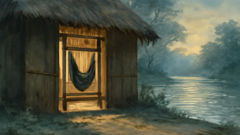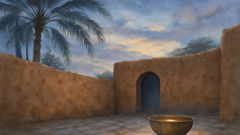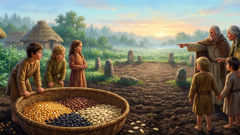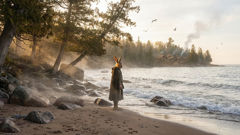Introduction
On the edge of the Atlantic coast, where the palm fronds murmur and the market stalls drift with the tide, the village of Idangwu keeps a memory older than the oldest shrine. The Abiku, a child who arrives with the first dew and departs with the next moon, visits each generation in a shape that is beautiful and terrible, a breath that enters a mother’s body and then slips away like a whisper along the river. In this tale we follow Amina, a mother who feels the world tilt when the midwives sing, and Olaiya, a father who counts the beads on a worn rosary and hopes for a different ending. The elders speak in half-hushed riddles about the day the child comes to stay, the day the song falters in the drums, the day the rain keeps its own secrets. The Abiku is not a demon or a curse but a soul that cannot stay fixed in one lifetime, a restless star learning to settle, even if only for a season. So the town learns to listen for the signs: a baby’s birth followed by a cold quiet, a dream that repeats with the dawn, a grandmother who hums an old lullaby that makes the air feel sacred. In a culture where memory is a bridge between worlds, the tale tests whether love can hold a fleeting life long enough to leave a trace in the earth and in the hearts of those who endure the ache of waiting. It is a memory that travels like a canoe along a midnight river, ferrying not just fear but the stubborn hope that love can endure what time would erase. The story invites you to walk with them, to learn how a village learns to live with the season of return and to trust that a story can hold its own breath, even as the child slips away and comes again in another form.
Section I: The Birth That Was Not
The first cry of the Abiku is not a promise but a question that circles the thatch roofs like a sparrow in rain. In Idangwu the mothers know the cadence of this arrival before the midwives lay hands on the baby; they recognize the way the breath comes in shorter bursts, how the cord remembers the old words spoken at birth, how the drumbeats drift to a slower tempo as if listening for a memory the body cannot keep. Amina, the latest mother to cradle a newborn, feels a change in the room the moment the child takes its first inhale. It is as if the village itself exhales, certain that a portion of joy will soon be returned to the sea. The child is luminous, a small sun in a woven cradle, and yet the grandmother who sways by the doorways speaks softly of offerings, of beads laid in an arc to guide a wandering spirit, of the need to call back not to imprison but to invite the spirit to stay a while longer. The elder men, sitting with their pipes and their memories, tell of a time when Abiku stayed for a season and then chose to walk back into the wind, leaving behind a memory etched into the earth like fishbone in a riverbed. In those stories, we hear a caution and a comfort: love is not a contract that binds a soul to a body, but a ritual that teaches the heart to endure the absence with grace. The birth that was not will linger in the air, a perfume of salt and rain, and every mother in the room will instinctively map out the future on the canvas of their child’s skin, reading the signs that life sometimes lends to a family that has learned to listen more than they speak. Amina keeps vigil, her hands against the tiny chest, counting breaths that arrive and depart with almost ceremonial patience, and the village learns anew to measure time not in hours but in the turning of the seas and in the turning of a lullaby into something with more voice than sorrow. The child grows under the patient tutelage of watchers who call the year by its lunar name and the day by its memory. Yet the Abiku is not a tale of failure but a trial: to keep faith with a life that chooses to walk away and to teach the living how to speak to the wind and still keep a place at the table for memory. The section ends not with a death but with a listening, a vow whispered into the smoke of a clay stove that the next birth may carry a different answer, or at least a new question that the village can endure together.

Section II: The Return That Names Itself
The Abiku returns not as a rumor but as a patient shape that slides through the walls at night, a breath that touches the mother's shoulder with the gentleness of rain. In the second year of her motherhood, Amina dreams a child who speaks in a language older than the house, telling her that the world is larger than the room with the clay pot and the palm leaf fans. The dream is not a fantasy but a map, guiding her through the seasons of sorrow to a place where the living and the dead walk side by side in daylight, not to frighten but to teach. The father, Olaiya, learns to cradle the ache rather than to chase it away; he learns the rhythm of quiet prayers and the patient art of letting go with gratitude for the time granted. The villagers gather the old songs—those lulling tunes that ride on the drum and the flute—and tell a story that becomes more of a medicine than a warning. They burn frankincense by the riverbank and pour maize beer for ancestors who have long since gone to sea, asking not for more life but for clearer sight to recognize the return when it comes. The Abiku grows again, not in flesh but in memory, a child who learns to wear the world differently, who teaches the family that love is a practice of welcome that does not demand possession. Yet even as the child breathes, the village discovers a paradox: to welcome a life anew is to invite the risk of loss once more. In accepting this risk, the people of Idangwu learn a different sort of courage, one that does not erase the past but folds it into a future where the beloved is never fully gone, only changed, and the act of letting go becomes a form of gratitude. The world broadens; the drumbeat widens; the river sings back to the heart that remembers how to listen for the wind that bears a name and a promise.

Conclusion
In the end the tale does not declare a victory over the Abiku, but it offers a covenant: a community that learns to hold memory with tenderness, to honor the life given even as it slips away, and to trust that the cycle of birth and return is not only a test of endurance but a form of love that widens the soul. Amina becomes a keeper of lullabies and prayers, teaching younger mothers that a life may be brief and still leave a lasting trace in a child’s laughter, in a grandmother’s smile, in the way a village remembers how to begin anew after a season of absence. The Abiku, who once arrived as a bright ember and vanished with the moon, returns again as a whispered blessing, a guiding star that steadies the heart when doubt gathers like rain clouds. The village learns to measure time not by the life of a single child but by the length of a shared memory, and the story travels outward like a fishing net, catching new listeners who learn to listen for the wind in their own homes. Thus the Abiku becomes less a curse and more a mirror: a reminder that life, even when brief, can sing a longer song if it is sung aloud by those who refuse to let memory fade.













